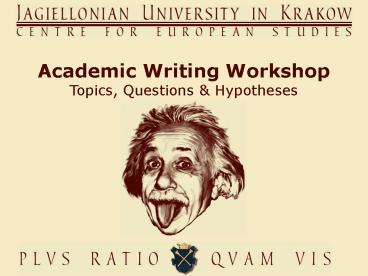Bez tytulu slajdu - PowerPoint PPT Presentation
1 / 22
Title:
Bez tytulu slajdu
Description:
holiday visit to Krakow. March. no student ID, start teaching English. submitted. August ... hypothesises that certain RC religious symbols have become Polish ... – PowerPoint PPT presentation
Number of Views:54
Avg rating:3.0/5.0
Title: Bez tytulu slajdu
1
Academic Writing Workshop Topics, Questions
Hypotheses
2
If we knew what we were doing, it wouldnt be
called research, would it? - Albert Einstein
3
This meeting
A calendar of your Thesis
Where do I find a topic?
Why do I need this hypothesis thing?
Hypothesis-first vs. theory-first
Research questions and naive hypotheses
Some common problems
4
Two students
5
First semester
coursework
term paper term paper exam exam exam
adviser
Thesis reading
Thesis reading
6
Second semester
Panic
presentation of plan
Juvenalia
defended
adviser signs form
presentation of nearly completed work
7
Third semester
submitted
cant find adviser
holiday visit to Krakow
8
I had no need for that hypothesis. -
Pierre-Simon Lapace 1872
9
Where do ideas come from?
1. Personal experience. 2. Advice from
friends/instructors/adviser. 3. What if 4.
Brainstorming (free writing, keywords) 5. Surfing
10
Questions and questions
Big questions and subsidiary questions The big
questions are almost always why or how
questions. The smaller ones may also include some
when where what or who questions
11
Undergraduate term papers
Simple expository writing model.
1. Who did what and when? questions
2. Text-based research (across disciplines)
3. Emphasis on deep description analysis
4. thesis statement
12
Humboldt Model
- Based on the ideas of Wilhelm von Humboldt
(1767-1835) - emphasis on research teaching is an effect of
research - written Theses/Dissertations
- based on the experimental tradition of the hard
sciences - reaction against the old medieval systems
13
Masters Thesis
Research results writing model.
1. Why and how? questions
2. Experimental ideal
2a. Research and methodology depend on
discipline(s)
2b. Looking for something new usually forces
you out of the well-used bits of the library
3. Large portion dedicated to formal analysis
4. Hypothesis
14
Two basic models of development
1. Hypothesis-first
2. Theory-first
15
Hypothesis-first
The classic hard-science model.
Face value Prove/disprove hypothesis.
Hidden Theory informs the choice of hypothesis.
For example The student hypothesises that
certain RC religious symbols have become Polish
national symbols.
16
Theory-first
The classic humanities model.
Face value Apply a theory to a subject.
Hidden The author hypothesises that this theory
will reveal something new and specific about
this subject.
For example The student writes a post-colonial
analysis of Czeslaw Miloszs poetry.
17
A successful hypothesis
1 Always must be testable (falsifiable). 2
Should be the simplest explanation (Occams
Razor) 3 but be a conservative fit with accepted
knowledge set. 4 Doesnt need to go too far
beyond the current data 5 ..but does promise to
be applicable to new opportunities. 6 It has
precise parameters 7 but a generality of scope.
18
Interesting
Something that pulls you in
1. An available intellectual space.
2. An emotional component the pull
19
Important
1. Direct and practical impact on the reality it
describes.
2. Knowledge that can be related to and advances
the existing body of knowledge.
Without scholarly importance, it would become a
how-to manual.
20
Your questions
1. Interesting?
2. Important?
3. Difficult?
21
Seven common research question problems
1. Answers in the wrong language.
2. Answers in the wrong country.
3. Answers cost too much money.
4. Answers unrecorded or confidential.
5. Answer will be available in the future.
6. Answer is too easy.
7. Answer cannot be considered European Studies.
22
Homework
Turn five questions into hypotheses.

